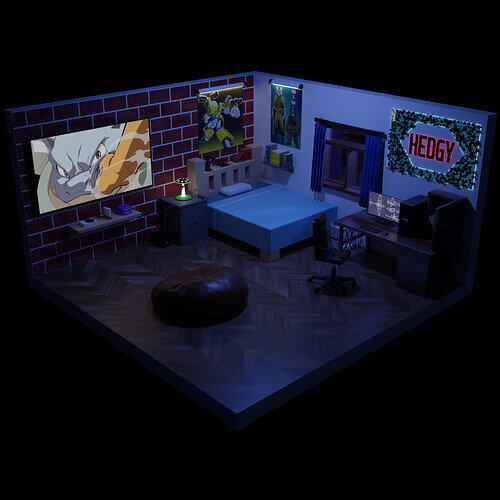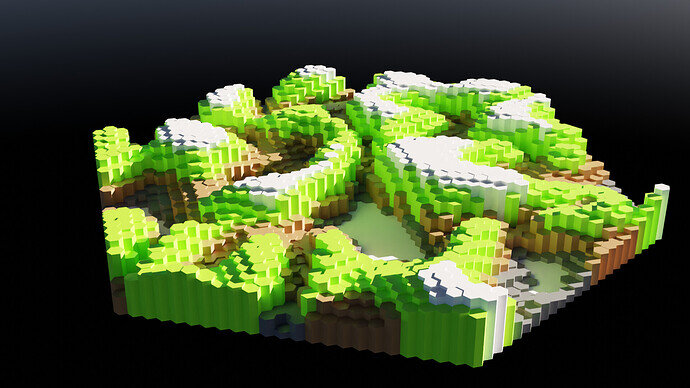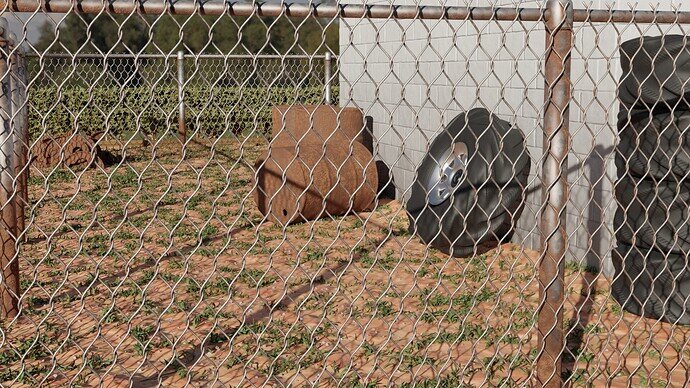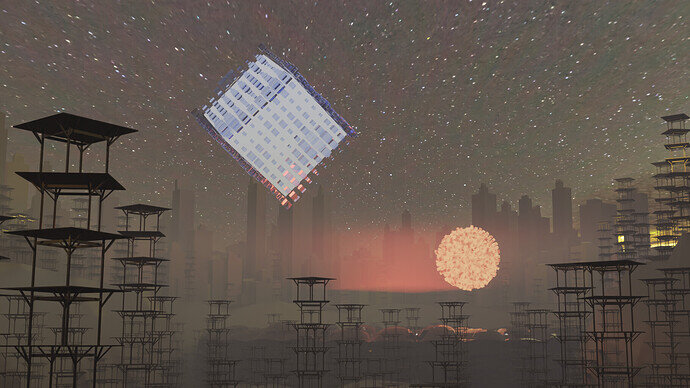I agree with this ![]() Super cool to see other people’s uses of geo nodes.
Super cool to see other people’s uses of geo nodes.
Yes I know, but to follow a tutorial and having your own layout, doesn’t help at all for complex geo nodes.
We @BlenderCollab have a few days to vote. You can vote fast but also think slowly about design, colors, technique, difficulty, subject, realism, etc. Choose consciously and not on your own entry.
And the new subject week 46 “Gnomes” has already started. The winner of this week’s “Tooling: Geo nodes ” challenge may select a subject for next week 47 and wins a badge.
0 voters
Doing this challenge, and seeing the things you’ve made, and on the web. Makes me think about when to use geo-node or do it the old fashion way. I think it’s all about efficiency, but when is it efficient?
Also, is it more game related? Generating landscapes, textures, fences, paths …
And while geo-nodes are very fancy in use, it is basically programming in a visual way. And no real developer likes to ‘program’ code like nodes.
Geo-nodes usage is slow in interpretation and gets easily complex. You need a big screen, you need to group trees. Bring structure to the tree visualization.
It is amazing what this new Blender tool can do for creative people. But still, my question is, when to use it?
I also think Blender needs to have functions where you can easily exchange and implement, the nodes setups. Because a geo node setup is nothing more than a software function, or an add-on. Connect one geo-node library to another library.
Like a gravity module, birds flock, etc. And probably there are normal add-ons for this.
Food for thought.
It has several functions (node groups):
- Generate a grid of points, zig-zagging to fit hexagons. These points will be used to inject a hexagon (a tube object with 6 points)
- Generate a mask in the shape of a hexagon, to fit hexagons into. This is done by geometry math’s (tangent, Sin, Cos …)
- It uses a noise texture to manipulate the z-ax height of the hex. But and image is also possible.
- It has two empties to manipulate the noise texture. The number of hex (density), the size (height) of the noise. And location, scale, rotation of these hexagons, and noise texture related.
- Some additional features, to change the hex material.
To show these features I try to make a video and post it here.
While I write this down, I see a possibility of endless flying over this landscape video clip.
The camera doesn’t move but the noise texture will. So many projects … ![]()
I followed this tutorial …
I’m not really sure.
But I’m interested in it for a couple of reasons…
You can manipulate geometry very quickly and animate it. For example taking an object such as a frying pan and morphing it into a pot. Or taking a row of text and making it dissolve into particles. Creating interesting patterns that can be made into motion graphics loops. etc.
It also seems to be a very good way to instance assets and randomize them on large areas, such as buildings, trailers, plants, or other misc items. I don’t know if there are better ways of doing that, but it is much faster than doing it one object at a time and data is also saved through instancing right? I’ve seen videos, there’s one released by the blender team just 13 days or so, where they’ve created several layers of geo nodes that can create really complex environments just by extruding planes across an area.
Also, before this challange I’ve just used geo nodes as a substitute for the array modifier because you can manipulate the base geometry more easily. For example instead of having a radial array with array modifiers, you can create a radial geo node system that allows you to customize the rotation, scale, and much more of individual items in the array and also change the curve geometry to become a spiral or whatever else is suitable for your scene.
I’m just saying whatever I can think of right now. But I think it’s an interesting discussion, and it is exactly why I chose this topic for the collab in the first place.
I can’t access Youtube right now. But will def check this out when I can 
There are Blender solutions available, but unheard of. Or not handled by Game Dev because I think of it’s technical nature. Like:
- Shapekeys
- Hooks (to vertices)
- Drivers
- and much more
So many not explained features. I understand the freedom of geo-nodes.
But for some geo-node solutions, there are appropriate existing Blender features.
I like geo-nodes, but it’s also a game changer … and a welcome addition to Blender.
Not really sure what Shapekeys are. I used hooks one time to hook vertices from curves to a control emtpy. I started learning a little bit about drivers from a rigging course I’m taking. But jesus yeah there is so much to learn with this software. A lifetime is not enough. Haha
I think there might be other solutions for the things that geo nodes can do. But I am not aware of them yet
Yes, geometry nodes are programming not making/creating in the normal maker way. It is a visual coding sort of thing instead of writing Python.
In possibly the most recent Pablo Blender weekly talk, he mentioned the first ready made geo node ‘modifiers’ being added into Blender by default. In effect ready made modifiers built from goe nodes. So normal users can just use them like we use standard modifiers, not coding the thing oneself. Hopefully, now this is the direction Geo Nodes will go in. Quickly be ready made node groups that do all the remotely useful common things that we just use as we do normal modifiers without even having to think about how they do it.
There are vanishingly small occasions that I might want cities, landscapes, etc. created for me, rather than me building exactly what I want them to be. Or variations on a theme of an object. We already have some forms of randomisation too. Perhaps repetitive games or animation/film environments do have more use for it.
Things like scattering we have already via particles, and the new geo node variation is fine and a good better variation. However, really it should be a ready made set up, no need to have to invent the wheel every time yourself. Yes, like procedural texturing nodes, most of us will dabble in the shallow end a bit, but not the super clever thousand nodes tree to make a cube into a flower of Nodevember style showing off.
Recently watched a terrible long boring node tutorial where he carefully showed us how it was done normally, curves to make stitches. Took him about 3 minutes. Then the next hour and a half showing how to get nodes to do it instead, (along with huge totally irrelevant rabbit hole diversions.) Ok yes the node version was probably more reusable, but not much really.
Greatest of respect for those whom programming is natural and they get on well with it, however I like electricity, but do not want to be a nuclear scientist making my own reactor to get it! I want to turn on the switch and it goes. For me there is a huge mental divide between traditional making, technical drawing, sculpting, etc mind types and programming mathematical ones. Of course some people can do both.
This may make me a dinosaur! I am fine with that at my age.
. . . let me die young.
It’s not my best video clip. But it shows the power of the tutorial I did follow. See the previous message for the tutorial hexagon link.
Nice. That’s giving me them sand table type projection feel you see in the sci-fi movies. Specially like the scrolling uv feel to it.
Correct me if I’m wrong. Instancing geometry with geo nodes is more data efficient than using particle systems. From my understanding the geo node instances uses the same data for all of the instances, similar to linked duplicates, whereas the particle system duplicates all of the particles with separate data. So you’re able to create more complex scenes with less data. But I’m not completely sure about this and I can’t access google right now so that’s why I’m asking.
I can relate to this. It really feels like inventing the wheel all over again, when I could think of other more straight forwards ways of doing things with the little knowledge I have atm. But geometry nodes is still being developed, and is still relatively new in Blender. Who knows what it will look like in a year or so. I just started learning geo nodes, and have watched older videos from just a couple of years ago, and the functionality and ease of use is rapidly improving. Worth keeping an eye on.
Haha. Not everyone is able to make quality teaching videos that are fun to follow. But I hope more will come with geo nodes.
I’m not a programmer in the least, only understand some basic fundementals. But for a visual learner like myself, it is actually really nice to have a node system that lets you create and adjust things without lines of code, but that produces similar results (based on your statement that it is similar to coding).
For me, I really enjoy watching unexpected things happen on the screen when I learn new tools and adjust values in Blender. And that is another reason why I think geo nodes are pretty fascinating. But then there’s another part of me that feels like I should just focus on some particular area of Blender rather than trying to learn a bit of everything. Hmmm, this is getting deep. Geonodes are fun! That’s it.
Yes re scattering I did say it is a better variation. Just that we should not have to ‘code’ it ourselves every time. It should be ready made modifier that we just add our items to be scattered and amounts.
I am not negative about them, they open up programming to a much wider use than if relying on Python or similar. Particularly those that want some bespoke solution for a particular need. A very basic understanding of them is going to be helpful, like with texturing nodes.
Specialisation in Blender and the whole area is fairly standard I believe, no one can master it all, especially in the more commercial sector.
Don’t know what to say after reading everything.
What I felt is that while Geometry Nodes are good it is being over rated exposed.
As the name suggests, it is based on Geometry, and the way I experienced it, it makes usages of the Geometry concepts. Mostly of Sin, Cos and Tan theta. I was, am and will remain Bad at Mathematics. So, it is not for me, and I don’t want any tutorial to follow blindly to attain a specific effect and for not able to know where exactly to repeat the exact concepts.
I do know a bit of programming (though novice) and am doing a bit in Unreal. But, I keep steer clear of the Mathematics Concept. I do Program in Python in Anaconda but steer clear from Linear Algebra. I stick to Regression (as I know it as a old student of Economics) and leave other things for others more capable ones.
Like everything else, Geometry Nodes, to the best my limited brain could decode, is another way of doing the same thing. I would rather be focused on mastering the Art way than Sin Q way !
Yeah ![]()
I’m not a real developer? ![]()
But seriously, GeoNodes UX is fine, but it has a long way to go before it will be for “real programmers” ![]() . I’m really enjoying coding with Unreal’s Blueprints, but geonodes not so much…
. I’m really enjoying coding with Unreal’s Blueprints, but geonodes not so much…
I don’t think so (unless you want to make a game in Blender). Game engines already have tools for doing those things. I actually would really like to see real use cases on game side of things that can’t be done easier with existing tools. Esp. when things like https://altermesh.com/ exists.
This a very lovely example of the use of procedural modeling (Geo nodes).
But I don’t think that a graphical artist, wants to use three parameters to generate a city.
It doesn’t give the artist any freedom whatsoever. It is too random. So who’s going to use this?
I’ve developed programs for many, many years. Seen a lot of visual tools to build applications. Oracle Forth generation language, Lego robotics. Macromedia Authorware, CMS, and now Blender Geo nodes. Most of these tools, have a way to add application code, to allow more specific solutions.
While these were very nice environments to work with. They are only suited for simple solutions. Of course, complex layouts are possible, but then it is very difficult to maintain or reuse.
Geo nodes will give the artist more freedom in creativity, without the need for a developer. But this means also more knowledge of Blender internals to the user.
It will be exciting to see, where this leads to.
I might not have been clear enough, but that’s more or less was my point… i.e., I’m not seeing anything useful for games at the moment with geonodes that isn’t possible to do already without them.
Same ![]() . And on top of my head I can just give 2 really successful examples of visual scripting that’s good from a software engineer perspective: shaders (esp. Unreal’s material editor) and Unreal’s blueprints.
. And on top of my head I can just give 2 really successful examples of visual scripting that’s good from a software engineer perspective: shaders (esp. Unreal’s material editor) and Unreal’s blueprints.
Some artists. It’s still a programming, that many artist just don’t like (and if that’s a first programming thing - the learning curve is steep).
Yup.
To add where I think GeoNodes might be useful, but that’s Blender only perspective:
- assembling stuff in blender from parts (procedural buildings, cities, guns, etc.)
- already mentioned scattering with better control over it vs particles. I remember when I was doing donut tutorial there was issue with sprinkles intersecting with each others - that was impossible to solve.
- when you need many variations of a thing it sometimes will be faster to take time and make it procedural. One example that I used is lighting bolts: it’s cool to have a generator so that each lighting bolt is different. Another interesting example I’ve seen is making cables.
- when randomness is inherent to a thing. It’s really tedious to model a lighting bolt by hand, and I think it will take as much time as learning it to do in geo nodes.
- making abstract things
- making repeatable things that are procedural, but dynamic in nature (like fences, tree branches, cables mentioned earlier, cobwebs, etc)
And I’ll leave this for more examples:
And also this twitter account has many cool examples of using GeoNodes:





